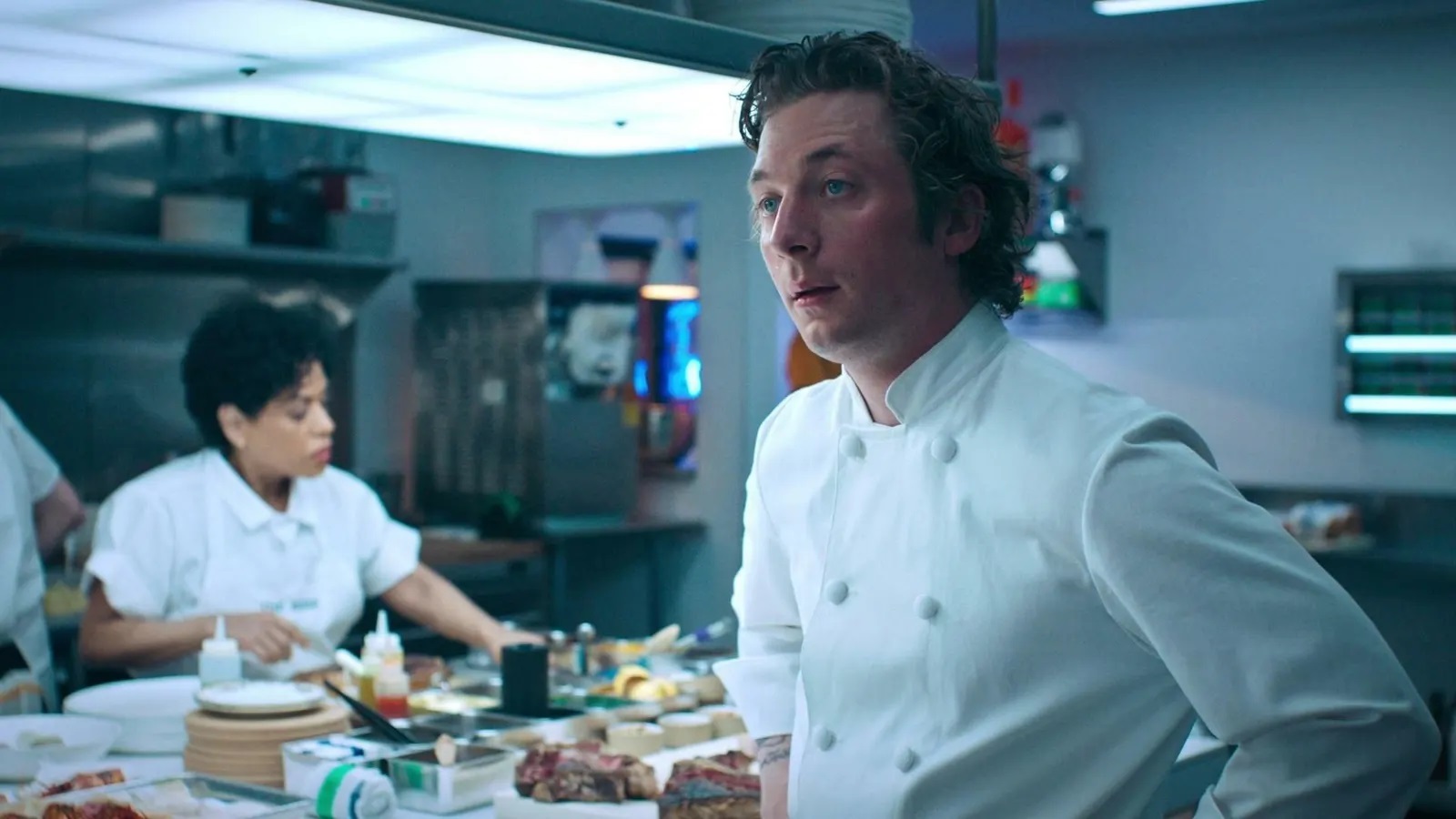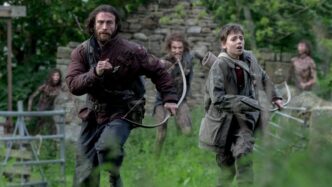As a fervent admirer of The Bear since its inception, I’ve been eagerly awaiting each new season, captivated by its intense drama, intricate character development, and raw portrayal of life in a high-pressure kitchen. Season 3 of The Bear, now streaming on Hulu, continues to delve into the chaotic lives of Chef Carmen “Carmy” Berzatto (Jeremy Allen White) and his eclectic team. However, while this season maintains the show’s signature intensity and emotional depth, it ventures into new territories that, for me, were somewhat hit or miss.
The Setup of Season 3: Scars and Ghosts
From the moment Season 3 begins, there’s a palpable shift in tone. The reflective nature of Carmy, alone in the dark and contemplating the scar on his palm, immediately sets the stage for a season deeply entrenched in themes of scars and ghosts. These elements are not only literal but also metaphorical, representing the lingering traumas and unresolved issues haunting our beloved characters.
The first episode, Tomorrow, employs a non-linear narrative that intricately weaves together multiple layers of Carmy’s past and present. We see flashbacks of his experiences in prestigious kitchens, learning from like Daniel Boulud, Rene Redzepi, and Thomas Keller, who appear as themselves. These scenes offer profound insights into Carmy’s character, but the fragmented structure can be disorienting, requiring multiple viewings to fully appreciate the timeline and its significance.
The Struggle for Perfection
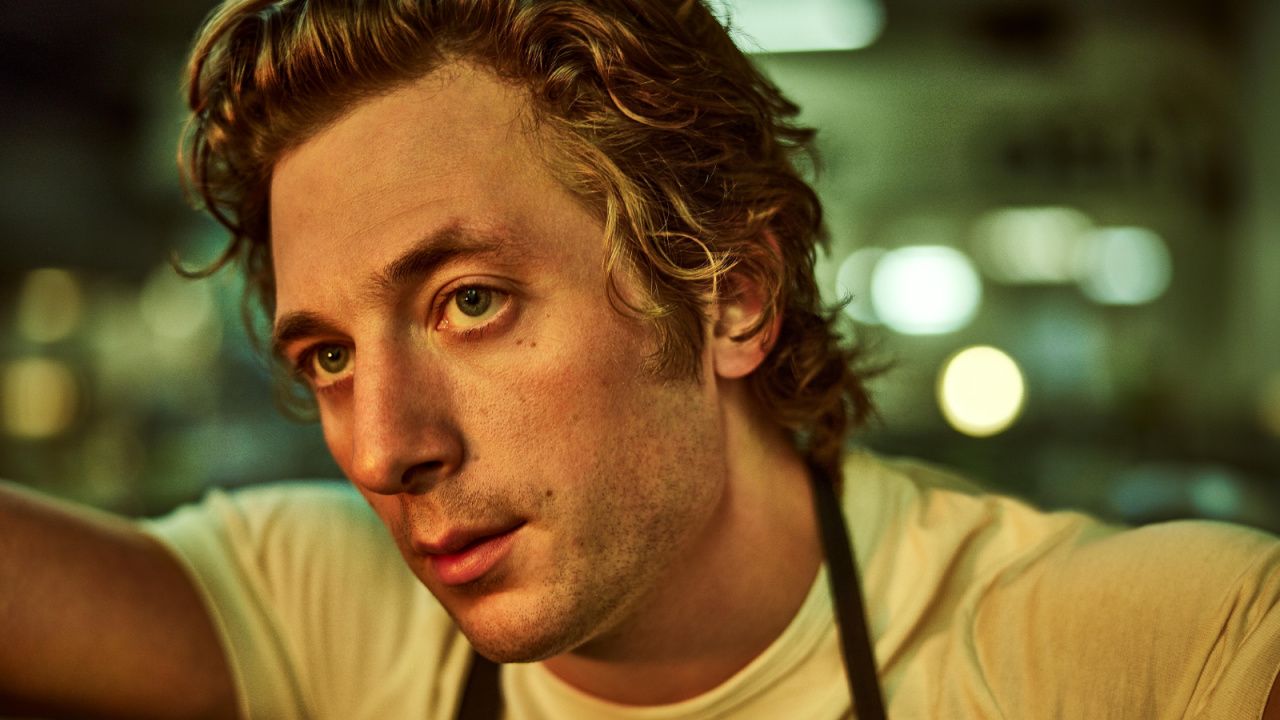
One of the recurring symbols this season is the humble pea. For Carmy, peas represent more than just a culinary challenge; they symbolize his quest for perfection, his trauma, and his search for peace.
This metaphor beautifully encapsulates Carmy’s internal conflict as he navigates the relentless pressures of the restaurant industry while grappling with his personal demons.
In the present, the restaurant is gearing up for its official opening night. The team faces immense pressure, with Carmy’s obsession with perfection and his stringent non-negotiables causing friction among the staff. Sydney (Ayo Edebiri), in particular, is affected by Carmy’s unilateral decisions, and her hesitation about committing to The Bear is palpable. Her struggle to balance her loyalty to the team with her personal ambitions adds a rich layer of complexity to her character.
Richie (Ebon Moss-Bachrach) also grapples with his evolving role within the restaurant. His journey of self-discovery, especially his realization of his talent for fine-dining service, is both touching and frustrating. The tension between him and Carmy reaches new heights, culminating in intense confrontations that highlight their deep, yet strained, bond.
Character Development and New Faces
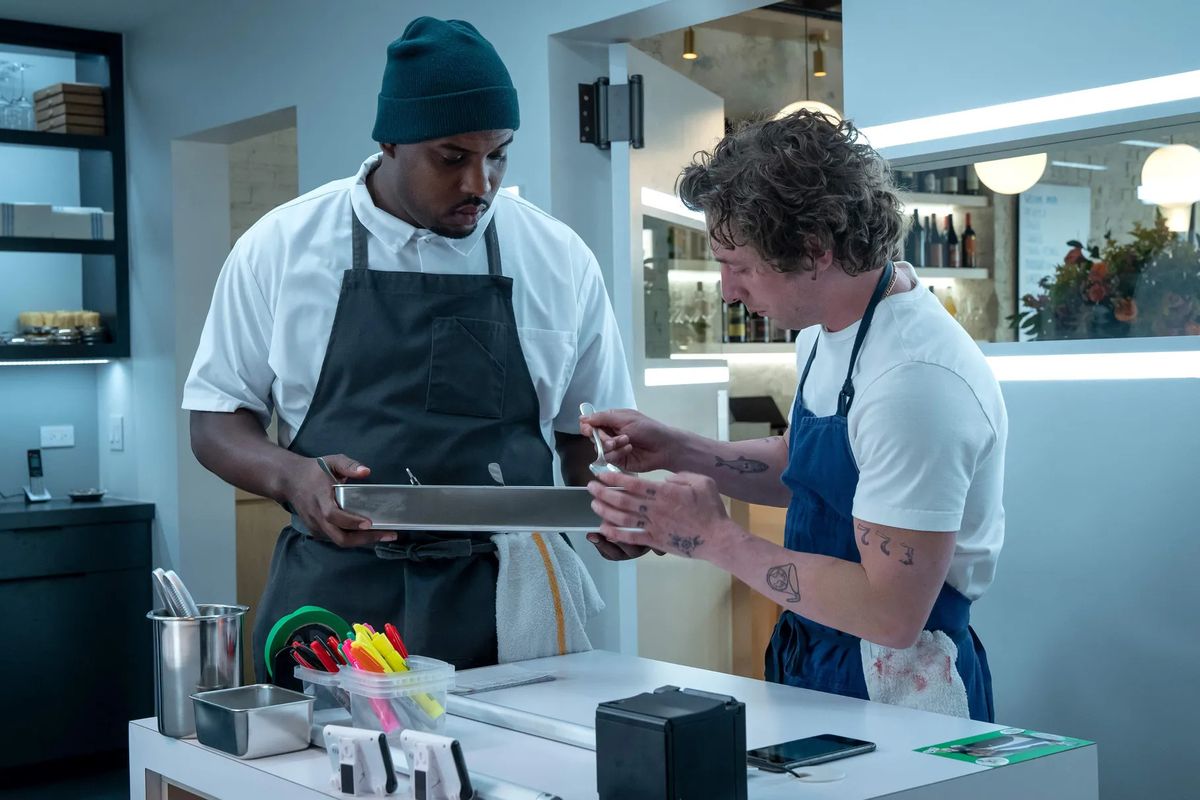
One of the strengths of Season 3 is its expanded focus on the supporting cast. Tina (Liza Colón-Zayas) and Marcus (Lionel Boyce) are given more screen time and deeper storylines. Tina’s backstory in the episode Napkins, directed by Edebiri, is a highlight, offering a poignant look at her journey and her place in the chaotic world of The Bear. Marcus’s attempt to channel his grief into his pastry creations is another compelling arc that adds emotional depth to the season.
The introduction of new characters and cameos from real-life chefs adds authenticity but can sometimes feel excessive. The frequent appearances by top-tier chefs, while interesting, occasionally overshadow the core narrative and detract from the development of the main characters.
The Balance of Comedy and Drama
The Bear has always balanced comedy and drama, and Season 3 continues this trend. The comedic moments, particularly those involving the Fak family, provide much-needed levity amidst the tension. John Cena’s cameo as Sammy Fak in episode 5, Children, is a standout, adding humor and charm to the series. However, the balance between comedy and drama is not always seamless, with some comedic elements feeling out of place in the more serious narrative.
Cliffhangers and Unresolved Tensions
Season 3 ends on a cliffhanger, leaving many plot threads unresolved. The final episode, Forever, centers on a funeral for the real-life Chicago restaurant Ever, featuring numerous cameos from celebrity chefs. While these appearances lend credibility, they also shift focus away from the main cast, leaving some storylines hanging.
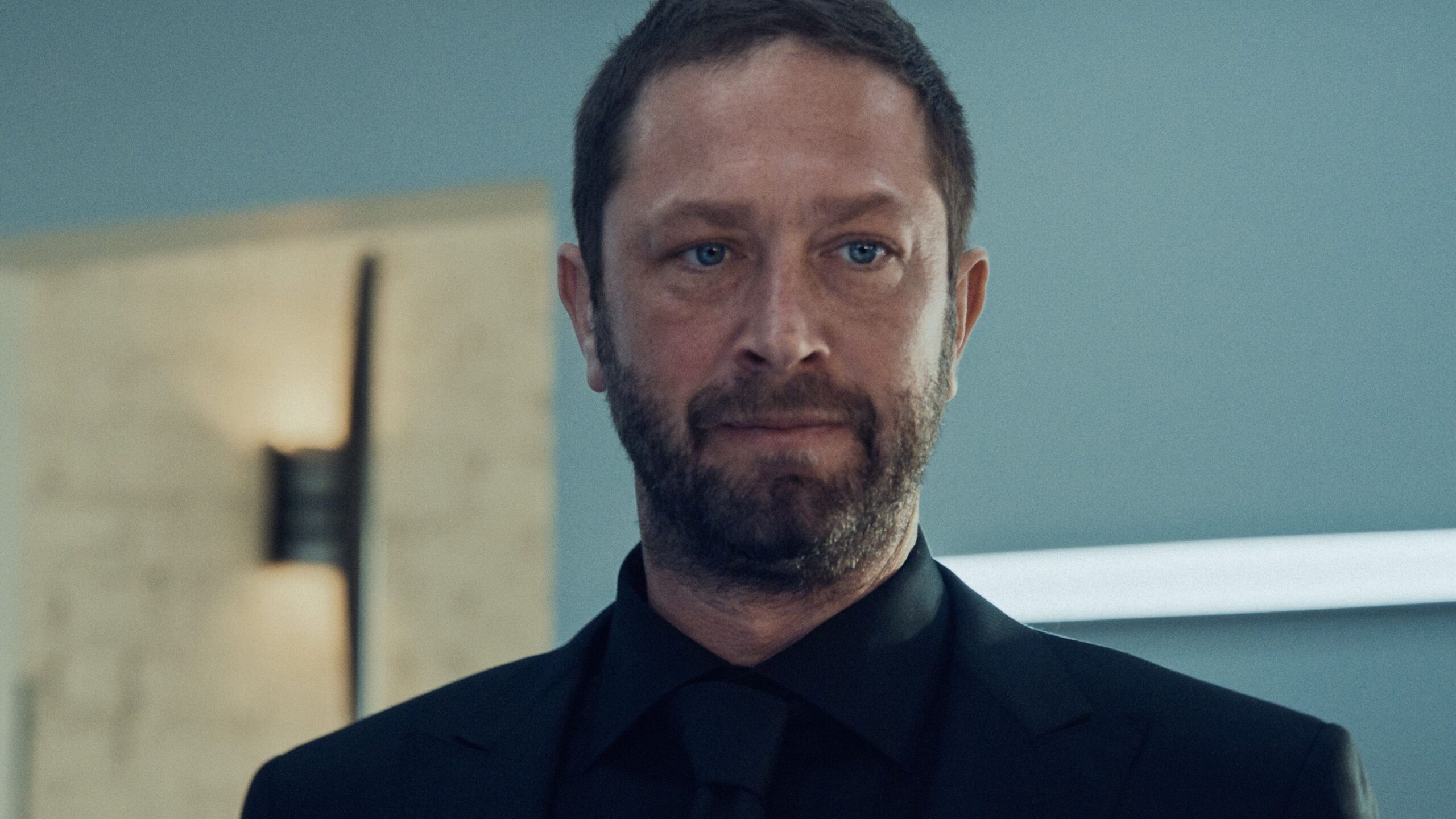
The unresolved tension between Carmy and Richie, Sydney’s indecision about her future, and the restaurant’s precarious financial situation all contribute to a sense of uncertainty that permeates the season. This open-ended conclusion is a bold choice, reflecting the ongoing struggles and complexities of the characters’ lives, but it can also be frustrating for viewers seeking closure.
The Lurking Shadows of the Past
Much of the disappointment I felt with Season 3 stems from its deep dive into the characters’ pasts at the expense of forward momentum. While the reflective nature of the season offers valuable insights, it sometimes feels like a retreat into nostalgia rather than a push towards growth.
The numerous flashbacks, though beautifully shot and rich with context, often disrupt the narrative flow and leave the characters—and the audience—stuck in a loop of unresolved trauma.
Carmy’s struggle with his past, particularly the trauma inflicted by his toxic mentor in New York, played by Joel McHale, is a recurring theme. These memories fuel his drive for perfection, but also his self-doubt and isolation. His relationship with Claire (Molly Gordon) is emblematic of this struggle. She represents everything good outside his kitchen, yet remains frustratingly out of reach, symbolizing the personal happiness Carmy continually sacrifices for his professional ambitions.
The Strain of Ambition
Sydney’s journey this season is equally fraught. Proud of her contributions yet wary of Carmy’s aggressive tendencies, she grapples with whether to sign a partnership contract that would cement her role at The Bear.
Her internal conflict is a poignant exploration of the cost of ambition and the sacrifices required to achieve it. The friction between her and Carmy serves as a key element that emphasizes the season’s exploration of the conflict between professional devotion and personal fulfillment.
At The Bear, the atmosphere is tense. Richie and Carmy’s unresolved conflict, Marcus’s introspection following his mother’s death, and Natalie’s (Abby Elliott) anxiety about her impending motherhood all add to the pressure. These personal struggles are compounded by the financial strain of running a high-end restaurant, a reality vividly depicted through Jimmy’s (Oliver Platt) incredulity at the exorbitant costs involved.
The Weight of Expectation
Perhaps my slight disappointment with Season 3 is partly due to the high expectations set by the previous seasons. The show’s first two seasons were masterful in their pacing and character development, with each episode building upon the last to create a cohesive and compelling narrative. Season 3, while ambitious in its exploration of character backstory and thematic depth, sometimes loses sight of this forward momentum.
The unresolved tensions and cliffhangers that conclude the season are indicative of this shift. While they set the stage for future development, they also leave the current season feeling incomplete. The open-ended nature of the finale, with many plot threads left dangling, can be seen as a bold narrative choice but also leaves viewers yearning for resolution.
Final Thoughts
Despite its flaws, Season 3 of The Bear remains a powerful and emotionally resonant series. Its exploration of the pressures and sacrifices inherent in the pursuit of culinary excellence is as compelling as ever. The show continues to shine in its character-driven storytelling, capturing the raw emotions and intricate relationships that define its characters.
As a fan, I appreciate the risks the creators have taken this season, even if they don’t always pay off. The show’s willingness to delve into the complexities of its characters’ lives and the intricacies of their relationships is commendable. There is an authenticity and honesty that permeates the series, grounding it even when it ventures into more experimental territory.
Season 3 may not be The Bear at its absolute best, but it is a bold, ambitious effort that stays true to the spirit of the show.
It challenges both its characters and its audience, asking us to grapple with difficult questions about ambition, identity, and the cost of success. While it may not provide all the answers, it offers a rich, multifaceted exploration of its world and the people who inhabit it.
Ultimately, The Bear Season 3 showcases how the show has grown and its dedication to pushing the limits. It is a journey worth taking, and as a fan, I remain deeply invested in the fate of these characters and their culinary endeavors. Here’s to the chaos, the clarity, and the continued evolution of The Bear.
